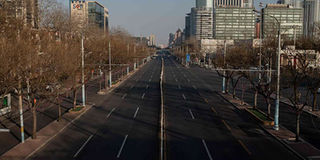It's hell in Wuhan: We live in constant fear and isolation

A deserted street is seen in Beijing on February 3, 2020. A virus similar to the SARS pathogen has killed more than 300 people in China and spread around the world since emerging in a market in the central Chinese city of Wuhan. PHOTO | NICOLAS ASFOURI | AFP
What you need to know:
- Although we take all the safety precautions when going out, it is hard to know when one will do something that will expose oneself to the virus.
- The prices of many basic items have also increased. We sit here every day, hoping the government will hear our constant cry for evacuation.
Ghostly, lonely, desolate. These are the words I used to describe the current state of Wuhan city a few days ago in my Twitter account.
That is exactly what the deadly coronavirus has reduced Wuhan into, a hollow city devoid of its usual lively bustle.
The city of Wuhan is approximated to have 11 million residents. On an ordinary day, it can be hard to manoeuvre around due to the sheer number of people around public places and busy streets.
However, the outbreak has forced everyone to stay indoors. It is now common to walk up to a kilometre or two without meeting any person and once in a while, a car or two will pass by.
On a Monday morning exactly two weeks ago, there was no indication that the virus was spreading beyond the control of the health authorities.
I set out to meet my friends in a neighbouring university for a social activity since the winter holidays had started in earnest and most colleges had closed.
UNDER LOCKDOWN
I used the public buses and interacted freely with everyone without a mask, oblivious of the danger I was exposing myself to.
Until that point, the media reports point to a virus with mild effects and although some deaths had been reported, they were no more than four.
Quite a number of people probably never even paid attention to these reports and statistics. A few days before that, the virus was said to have acquired a human-to-human transmission, and I remember asking a friend from the Wuhan Virology Institute what that meant for our safety.
We chatted the day away and barely mentioned the subject again. Later that evening, my friends and I would visit a popular restaurant for a dinner of fish and rice.
Less than 48 hours later, the whole city was put under total lockdown. The public transportation system was taken out of service.
The public buses, Metro, light rail, and taxis were all ordered to withdraw their services off the road.
The main airport, Wuhan Tianhe International airport, also shut its operations.
QUARANTINE
The slow and fast trains into and out of Wuhan were not spared either. It became a case of no one in, no one out. Our lives changed from that very moment.
We have now been restricted indoors. My lab, which would have been open even during the holidays, was duly closed.
And so, have many others offices around the school. No more than two people are allowed to congregate.
Today is day 13 of the quarantine and the situation does not seem to ease out any time soon.
The death toll has surpassed 300 souls, and the number of infections within and outside the country continues to increase each passing day.
The quarantine has forced us to live in isolation and these worrying statistics on the spread of the virus can have a negative psychological effect on any person.
Once in a while, I open the door to my balcony to have a peek at what is happening outside.
ABSURD ROUTINE
It is hard not to be emotional at the sight of the emptiness of the city outside.
A bird or two can be heard singing from a distance, trying to reassure the residents that all will be well.
I can hear a dog barking, and the echo reverberating back betrays the sad and hollow state of the city.
At some point, I need to close the balcony door again, since the cold season is not yet over. I am back to staring at my computer, trying to complete my thesis and conference papers.
The routine nature of what I do daily exaggerates boredom to the absurd. When I wake up, I read social media feeds, watch a movie or two, cook, eat, work in my computer, call friends and family members, sleep, wake up and start all over again.
Once in a while, I venture out to get a fresh stock of vegetables, fruits, and other essentials.
Although we take all the safety precautions when going out, it is hard to know when one will do something that will expose oneself to the virus.
WARM DAY
The Spring Festival holiday has also seen several shops closed and the few that are available, are open for a limited period of time.
The prices of many basic items have also increased. We sit here every day, hoping the government will hear our constant cry for evacuation.
In the meantime, we can only hope that this huge nightmare will soon go away. The Spring season has just begun, and signals the end of the tough and cold Winter season.
It usually comes with warm episodes of sunshine, trees that had shed leaves will soon sprout new leaves, and flowers will bloom.
We hope this Spring season will also signal the end of this deadly virus, and the warm sunshine will put a smile back to the residents of Wuhan.
May the new leaves and flowers of Spring remind us all that despite all the challenges we face every day, humanity will always rise up and triumph!
Mr Kipkorir is an MSc Vehicle Engineering student at Wuhan University of Technology




